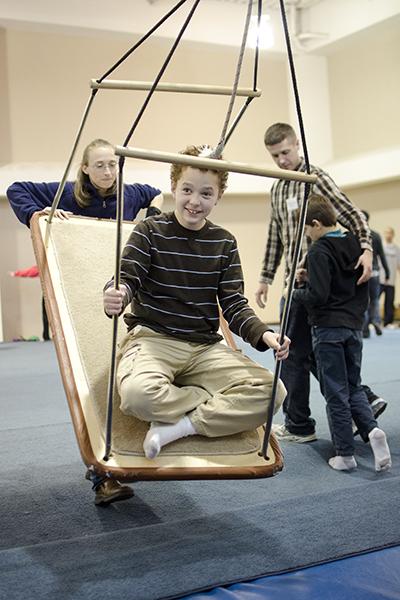Professor assists children with intellectual disabilities

Volunteer pushes autistic child on swing:Volunteer Mandy pushes Will on a swing during a volunteer program for children with autism set up by professor Scott Modell in Solano Hall.:Robert Linggi – State Hornet
February 23, 2011
Adaptedphysical education professor ScottModell attributes his motivation to pursue a career in assisting those with disabilitiesthrough community programs and teaching to his brother, Chris Modell, who was diagnosed with an intellectual disability at a young age. “Having someone with an intellectual disability growing up gave me a perspective that you would not otherwise have,” Modell said. “I was able to see firsthand his struggles and the prejudices that existed for persons with intellectual disabilities. I would see how crushed he was when someone would call him a “retard.'”
Modell has been teaching withinSacramentoState’skinesiologyand health science department for 14 years. His main concentration is adapted physical education, in which he earned a master’s degree fromFlorida State University. Hehasalsoearned a doctorate in special education.
The basis of adapted physical education is planning and developing effective fitness activities forindividuals with disabilities. He regularly teaches five different courses on the subject.
Outside of the classroom, Modell has done presentations at localelementary school districtsteaching the administration how to better understand and treatstudents with disabilities. He has also written training manuals for law enforcement agencies, instructing them in the proper way to handle individuals with an intellectual disability.
“Between the courses that I teach, the workshops that I present and the programs that I organize and direct &- I stay pretty busy,” Modell said.
One of the programs Modell directs, located on theSac State campus, is the Autism Center for Excellence.
Every weekday during the semester, from3 to 6 p.m., children with autismages 8-12 who are enrolled in the program arrive at Solano Hall, Room 1000, to practice social, communicative andmotor skillswith student interns.
United Cerebral Palsyof Greater Sacramento, a group that provides services for children with developmental disorders, contributed $150,000 for the center’s development and operation.
The organization approached Modell with the idea and the start-up funds for the Autism Center for Excellence in 2007, and not long after, the program began.
The center’s program splits children into groups that focus on different areas of improvement. Children dance, hop and skip asphysical exercisesin themotor skills group. Another group is communication, where the kids play board games and identify objects. Children follow instructions in the socialization group, oftentimes drawing and painting pictures.
“They’re having so much fun that they don’t even think about it being a learning experience,” said Daniel Eisentrager, assistant director of the Autism Center for Excellence.
The students working for the center come from a variety of different departments, but consist primarily of kinesiology, psychology, special education, nursing andspeech pathologymajors. Interns go through two days of training to learn the processes before the start of the semester, so having expertise in any particular field is not mandatory.
“The good thing about having student interns working with the children opposed to older adults is that it creates a big-brother and big-sister atmosphere,” Eisentrager said.
There are nearly 40 unpaid student interns fromSac Stateon staff at the center. Students are required to spend at least 135 hours working at the center to receive their three credits for the internship in appliedphysical education course.
Modell said the most gratifying thing about directing the Autism Center for Excellence is witnessing the children in the program demonstrate dramatic improvement in social abilities over time.
“There was one child withautismthat entered the center with especially low social skills, and spent six months going through behavioral and communicative training in the program,” Modell said, “One of the days that I brought my son in to visit the center, the child walked up, introduced himself and politely asked if my son wanted to play. Improvement like that is always great to see.”
Besides the Autism Center for Excellence, Modell has established other programs in Sacramento &- all focused on benefiting those with physical and intellectual disabilities.
“I try and set up programs that are based on the needs of the community,” Modell said. “Programs that give children with intellectual disabilities an opportunity to participate in group based activities is essential for their development.”
Brett Johnson can be reached at [email protected]




























































































































